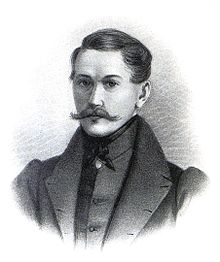Alexander Nikolajewitsch Sutgof
Alexander Nikolayevich Sutgof ( Russian Александр Николаевич Сутгоф ; December 4 jul. / 16th December 1802 greg. In Kiev , Kiev Governorate , Russian Empire ; † August 14 jul. / 26 August 1872 greg. In Borjomi , Georgia , Russian Kaiserreich) was a Russian Decembrist .
Life
Alexander Sutgof was born as the son of the Russian major general and commander in the Patriotic War Nikolai Ivanovich Sutgof (1765-1836) and his wife Anastassija Wassiljewna Michailowa († after 1855) in Kiev. At the noble boarding school of Moscow University , he began an education, which he could not finish. On March 29, 1817, he joined the Russian army , where he was promoted to ensign on September 7, 1817 and to lieutenant on April 29, 1820. In September 1825 he joined the Northern League of the Decembrist Movement. He took jul on the eve of December 14th . / December 26, 1825 greg. took part in the decisive meeting in Kondrati Ryleev's apartment and took part with his unit the next day in the Decembrist uprising on Senate Square in Saint Petersburg . On the same day he was arrested in a private house opposite the riding hall (Manege) of the Chevaliergarde ( Конногвардейский манеж ) and immediately detained in the Peter and Paul Fortress .
As a guilty party of category I determined by the investigative commission, he was initially sentenced to death, but on July 10, 1826 the sentence was reduced to life-long hard labor. Sutgof was transferred to Svartholm in Finland on August 8, 1826 , where his sentence was reduced to 20 years on August 22, 1826. On June 21, 1827 he was transferred to Siberia, where he was transferred to the Ostrog Chita ( Читинский острог ) in Transbaikalia on August 25, 1827 and in September 1830 to the Katorga Petrowski Sawod (Peter's hut). On November 8, 1832, the sentence was reduced to 15 years and reduced to 13 years on December 14, 1835. After completing his sentence on July 10, 1839, he was forcibly resettled near Shilkino ( Жилкино ) near Irkutsk , where he entered into a childless marriage and worked in agriculture. After the house he had bought burned down, he was resettled in the village of Ust-Kuda ( Усть-Куда ) in 1841 and in Malaya Razvodnaja ( Малая Разводная ) in the Irkutsk governorate in 1841 .
On May 31, 1848, at his mother's request, he was allowed to serve as a common soldier in the Kuban Regiment, where he was promoted to sergeant on November 20, 1850 and to ensign on November 19, 1854. Because of an illness he was sent to Moscow for six months in 1855 . The amnesty of August 26, 1856 gave him back his previous rights. On December 30, 1857 Sutgof was transferred to the 6th Reserve Battalion of the Kuban Infantry Regiment in the Yekaterinoslav Governorate and on January 13, 1858 was appointed head of the Moscow fencing school. On February 9, 1859, he received the rank of Second Lieutenant and on March 1, 1859, he was discharged from the army. He worked as an administrator until the beginning of 1864 and then rejoined the Kuban infantry regiment in his old position, where he was promoted to captain, before he finally died in Borjomi in 1872 at the age of 70 and was buried there.
Web links
- Entry on Alexander Nikolajewitsch Sutgof in the Kiev calendar (Russian)
- Article on Alexander Nikolajewitsch Sutgof in biografii.niv.ru (Russian)
Individual evidence
- ↑ a b Entry on Alexander Nikolajewitsch Sutgof in the Great Biographical Encyclopedia (2009); accessed on December 6, 2018 (Russian)
- ↑ a b c biography of Alexander Nikolajewitsch Sutgof on hrono.ru ; accessed on December 6, 2018 (Russian)
- ↑ Entry on Alexander Nikolajewitsch Sutgof in the Borowkow or Decembrist alphabet on the Decembrist website ; accessed on December 6, 2018 (Russian)
- ↑ Entry on Alexander Nikolajewitsch Sutgof in Brockhaus-Efron ; accessed on December 6, 2018 (Russian)
| personal data | |
|---|---|
| SURNAME | Sutgof, Alexander Nikolajewitsch |
| ALTERNATIVE NAMES | Сутгоф, Александр Николаевич (Russian) |
| BRIEF DESCRIPTION | Russian Decembrist |
| DATE OF BIRTH | December 16, 1802 |
| PLACE OF BIRTH | Kiev , Kiev Governorate , Russian Empire |
| DATE OF DEATH | August 26, 1872 |
| Place of death | Borjomi , Georgia , Russian Empire |
